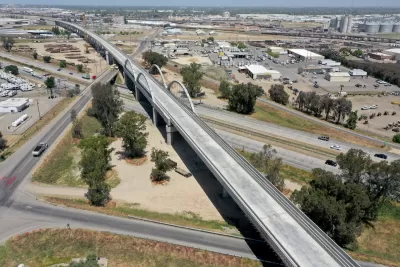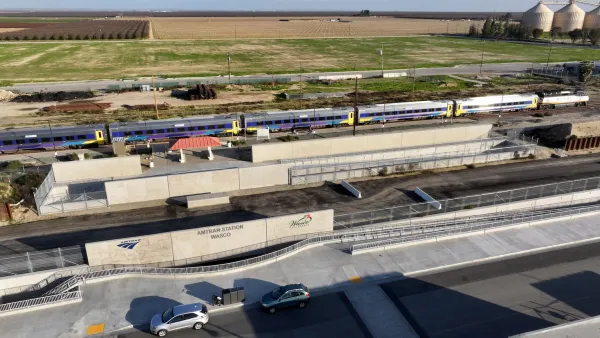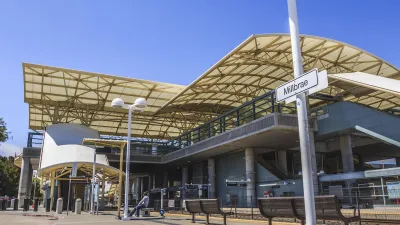USDOT says it will evaluate the funding currently committed to the construction of California’s high-speed rail project, which has run years behind schedule and billions over its projected budget.

The U.S. Department of Transportation (USDOT) will “review” federal funding for California’s high-speed rail project, a decades-in-the-making rail line designed to connect the San Francisco Bay Area to Los Angeles.
According to an article in the San Francisco Chronicle by Rachel Swan, “The review would ‘help determine’ whether the money should ‘remain committed’ to the railway’s first segment between Merced and Bakersfield in the Central Valley, spokespeople for the U.S. Department of Transportation said in a news release, casting the future of the project in jeopardy.” In a press release announcing the audit, Transportation Secretary Sean Duffy called the project “massively over-budget and delayed.”
The project has 171 miles of track already under construction in the Central Valley, where the first segment is expected to open. “In the coming years, state officials hope to link high-speed rail to two other bullet train lines – the High Desert Corridor in Los Angeles and the privately-owned Brightline West route from Las Vegas to Rancho Cucamonga (San Bernardino County).”
The project gained approval for the final southern segment of its route from the California High-Speed Rail Authority Board of Directors in July of 2024 and was counting on a $3.4 billion federal grant to extend the line from San Jose to San Francisco.
FULL STORY: U.S. Sec. of Transportation to audit California’s high-speed rail project

Planetizen Federal Action Tracker
A weekly monitor of how Trump’s orders and actions are impacting planners and planning in America.

Maui's Vacation Rental Debate Turns Ugly
Verbal attacks, misinformation campaigns and fistfights plague a high-stakes debate to convert thousands of vacation rentals into long-term housing.

Restaurant Patios Were a Pandemic Win — Why Were They so Hard to Keep?
Social distancing requirements and changes in travel patterns prompted cities to pilot new uses for street and sidewalk space. Then it got complicated.

In California Battle of Housing vs. Environment, Housing Just Won
A new state law significantly limits the power of CEQA, an environmental review law that served as a powerful tool for blocking new development.

Boulder Eliminates Parking Minimums Citywide
Officials estimate the cost of building a single underground parking space at up to $100,000.

Orange County, Florida Adopts Largest US “Sprawl Repair” Code
The ‘Orange Code’ seeks to rectify decades of sprawl-inducing, car-oriented development.
Urban Design for Planners 1: Software Tools
This six-course series explores essential urban design concepts using open source software and equips planners with the tools they need to participate fully in the urban design process.
Planning for Universal Design
Learn the tools for implementing Universal Design in planning regulations.
Heyer Gruel & Associates PA
JM Goldson LLC
Custer County Colorado
City of Camden Redevelopment Agency
City of Astoria
Transportation Research & Education Center (TREC) at Portland State University
Jefferson Parish Government
Camden Redevelopment Agency
City of Claremont





























